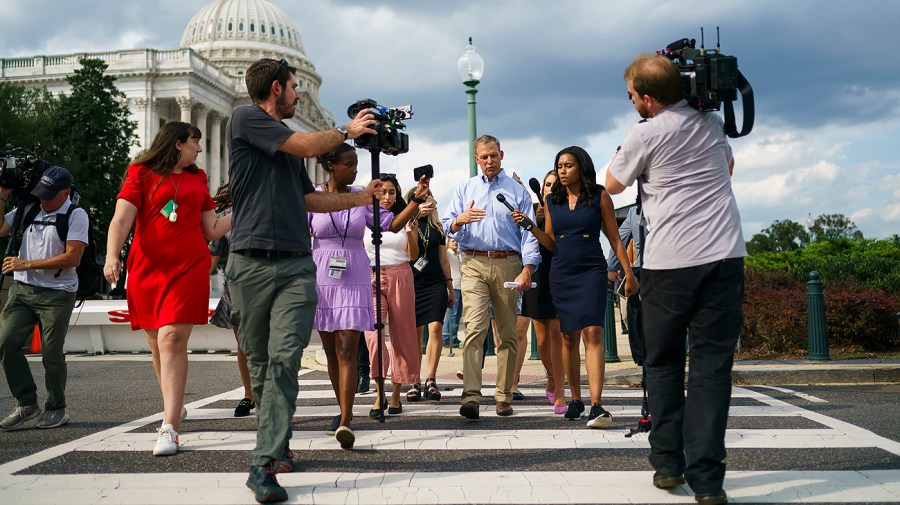Business
Spending deal that helped sink McCarthy sees new hope as conservatives ease up on December 5, 2023 at 11:05 am Business News | The Hill

After months of infighting, bruising failed floor votes and the historic ouster of their leader, House Republicans could end up falling back on a bipartisan debt ceiling deal struck by former Speaker Kevin McCarthy (R-Calif.) earlier this year that helped lead to his undoing.
The agreement, brokered by the White House and GOP leadership, appears to be seeing the greatest glimmers of hope since its passage in the spring, as hard-line conservatives soften demands for cuts steeper than those laid out in the compromise.
“Basically, they agreed to what we had said all along, that the numbers that the Speaker agreed to with the president were the numbers that are set and the numbers we should live by,” Rep. David Joyce (R-Ohio), a spending cardinal on the House Appropriations Committee, told The Hill.
House Republicans have repeatedly clashed this year over spending, as the right flank pressured GOP leadership to take a more aggressive stance on spending levels in the conference’s 12 annual government funding bills.
The strategy was to achieve the most conservative starting position possible ahead of eventual negotiations with Senate Democrats. But as the House GOP struggles to unify behind its five remaining funding bills, some in the right flank are letting up on their push for significantly lower funding levels, which they acknowledge is no longer achievable.
Rep. Scott Perry (R-Pa.), head of the ultraconservative House Freedom Caucus, said last week that the $1.59 trillion discretionary spending level set as part of the Fiscal Responsibility Act (FRA) for fiscal 2024 needed to be accepted as “the limit” in bicameral spending negotiations.
While he said the number is still “too high” for the caucus, his comments come as the group is pressing for both chambers to begin to conference their drastically different batch of funding bills as soon as possible, particularly as Congress stares down another government shutdown deadline in January.
“We never agreed to this number, but we understand that, right now, we’re in peril of actually being at like $1.8 [trillion] as opposed to $1.59 [trillion],” he argued Friday, while taking aim at the Senate over “additional packages” the upper chamber could pass in the weeks ahead as it considers aid for Israel and Ukraine.
“So, we’re just saying, look, you already voted for $1.59 [trillion] in FRA. That’s the limit,” Perry said.
While the caucus’s shift on the issue has drawn attention in the past week, some in the conference view the change in tone as a long time coming.
“This is where I always thought we would end up,” Rep. Tom Cole (R-Okla.), another spending cardinal, said. “So, I’m not surprised that they understood that something that both houses had passed and the president signed was probably going to be the deal.”
The House Freedom Caucus had pushed for a top line of $1.47 trillion for the conference’s starting position ahead of bipartisan talks with the Senate, while sharply criticizing the budget deal struck by McCarthy as part of a larger agreement to raise the debt ceiling.
Members of the caucus repeatedly used hard-line tactics on the floor to pressure leadership for steeper cuts to the party’s funding bills, before some in the right flank touted an internal agreement from leadership in September to craft the party’s spending bills to a top-line level of about $1.526 trillion.
But tensions hit a fever pitch later that month, just as government funding was also set to run out, as McCarthy struggled to pass legislation to keep the lights on amid internal disagreements on spending.
Despite the add-ons to the GOP-proposed stopgap bill that called for immediate cuts and border policy changes intended to sweeten the pot for conservatives, the measure failed to gain adequate support from the conference.
That led McCarthy to bring up a bipartisan stopgap in the eleventh hour that averted a shutdown — but also helped cost him his job.
The conference eventually passed several more of its annual spending bills under the leadership of Speaker Mike Johnson (R-La.).
But Republicans face serious hurdles to passing their remaining spending bills, which include some of the party’s biggest proposed cuts to nondefense programs, amid divisions over spending and thorny policy riders on issues such as abortion.
At the same time, senators have also been held up passing their government funding bills as lawmakers have been working to strike an ambitious deal on a supplemental funding package that could include aid for Israel and Ukraine, as well as what Republicans hope are changes to border policy.
As the annual appropriations work stalls in both chambers, lawmakers are hoping for a bicameral top-line agreement soon to kickstart bipartisan spending talks.
Cole, who heads the subcommittee that oversees funding for the Department of Transportation, said Friday that he’s expecting to hear from GOP leadership this week on what top lines could look like in talks, as well as other issues such as rescissions.
Earlier this year, Biden administration officials said the bipartisan debt limit agreement reached in May also included a handshake deal to pull back $20 billion in IRS funding that Democrats approved in the last Congress, with the purpose of reinvesting those funds into discretionary funding for nondefense programs.
While hard-line conservatives have let up in their demands for spending below the budget caps agreed to by McCarthy and President Biden, Perry and others have already spoken out against rescissions to yank back old funding to offset spending elsewhere.
“It’s still spending. When you add it up, the dollars that go out, have got to equal some number,” Rep. Ralph Norman (R-S.C.) said. “You can’t plus it back up. That includes the supplementals and the rescissions.”
While Cole called rescissions a “normal tool” in Congress, he also said “whatever agreement was had was the agreement with Speaker McCarthy” and that he doesn’t see the current Speaker as “bound by it.”
“It’s up to him, but we’ll work with whatever number and with whatever tools the current Speaker thinks is more appropriate,” Cole said.
House, Business, News After months of infighting, bruising failed floor votes and the historic ouster of their leader, House Republicans could end up falling back on a bipartisan debt ceiling deal struck by former Speaker Kevin McCarthy (R-Calif.) earlier this year that helped lead to his undoing. The agreement, brokered by the White House and GOP leadership, appears…
Business
Google Accused Of Favoring White, Asian Staff As It Reaches $28 Million Deal That Excludes Black Workers

Google has tentatively agreed to a $28 million settlement in a California class‑action lawsuit alleging that white and Asian employees were routinely paid more and placed on faster career tracks than colleagues from other racial and ethnic backgrounds.
- A Santa Clara County Superior Court judge has granted preliminary approval, calling the deal “fair” and noting that it could cover more than 6,600 current and former Google workers employed in the state between 2018 and 2024.

How The Discrimination Claims Emerged
The lawsuit was brought by former Google employee Ana Cantu, who identifies as Mexican and racially Indigenous and worked in people operations and cloud departments for about seven years. Cantu alleges that despite strong performance, she remained stuck at the same level while white and Asian colleagues doing similar work received higher pay, higher “levels,” and more frequent promotions.
Cantu’s complaint claims that Latino, Indigenous, Native American, Native Hawaiian, Pacific Islander, and Alaska Native employees were systematically underpaid compared with white and Asian coworkers performing substantially similar roles. The suit also says employees who raised concerns about pay and leveling saw raises and promotions withheld, reinforcing what plaintiffs describe as a two‑tiered system inside the company.
Why Black Employees Were Left Out
Cantu’s legal team ultimately agreed to narrow the class to employees whose race and ethnicity were “most closely aligned” with hers, a condition that cleared the path to the current settlement.

The judge noted that Black employees were explicitly excluded from the settlement class after negotiations, meaning they will not share in the $28 million payout even though they were named in earlier versions of the case. Separate litigation on behalf of Black Google employees alleging racial bias in pay and promotions remains pending, leaving their claims to be resolved in a different forum.
What The Settlement Provides
Of the $28 million total, about $20.4 million is expected to be distributed to eligible class members after legal fees and penalties are deducted. Eligible workers include those in California who self‑identified as Hispanic, Latinx, Indigenous, Native American, American Indian, Native Hawaiian, Pacific Islander, and/or Alaska Native during the covered period.
Beyond cash payments, Google has also agreed to take steps aimed at addressing the alleged disparities, including reviewing pay and leveling practices for racial and ethnic gaps. The settlement still needs final court approval at a hearing scheduled for later this year, and affected employees will have a chance to opt out or object before any money is distributed.
H2: Google’s Response And The Broader Stakes
A Google spokesperson has said the company disputes the allegations but chose to settle in order to move forward, while reiterating its public commitment to fair pay, hiring, and advancement for all employees. The company has emphasized ongoing internal audits and equity initiatives, though plaintiffs argue those efforts did not prevent or correct the disparities outlined in the lawsuit.
For many observers, the exclusion of Black workers from the settlement highlights the legal and strategic complexities of class‑action discrimination cases, especially in large, diverse workplaces. The outcome of the remaining lawsuit brought on behalf of Black employees, alongside this $28 million deal, will help define how one of the world’s most powerful tech companies is held accountable for alleged racial inequities in pay and promotion.
Business
Luana Lopes Lara: How a 29‑Year‑Old Became the Youngest Self‑Made Woman Billionaire

At just 29, Luana Lopes Lara has taken a title that usually belongs to pop stars and consumer‑app founders.
Multiple business outlets now recognize her as the world’s youngest self‑made woman billionaire, after her company Kalshi hit an 11 billion dollar valuation in a new funding round.
That round, a 1 billion dollar Series E led by Paradigm with Sequoia Capital, Andreessen Horowitz, CapitalG and others participating, instantly pushed both co‑founders into the three‑comma club. Estimates place Luana’s personal stake at roughly 12 percent of Kalshi, valuing her net worth at about 1.3 billion dollars—wealth tied directly to equity she helped create rather than inheritance.

Kalshi itself is a big part of why her ascent matters.
Founded in 2019, the New York–based company runs a federally regulated prediction‑market exchange where users trade yes‑or‑no contracts on real‑world events, from inflation reports to elections and sports outcomes.
As of late 2025, the platform has reached around 50 billion dollars in annualized trading volume, a thousand‑fold jump from roughly 300 million the year before, according to figures cited in TechCrunch and other financial press. That hyper‑growth convinced investors that event contracts are more than a niche curiosity, and it is this conviction—expressed in billions of dollars of new capital—that turned Luana’s share of Kalshi into a billion‑dollar fortune almost overnight.
Her path to that point is unusually demanding even by founder standards. Luana grew up in Brazil and trained at the Bolshoi Theater School’s Brazilian campus, where reports say she spent up to 13 hours a day in class and rehearsal, competing for places in a program that accepts fewer than 3 percent of applicants. After a stint dancing professionally in Austria, she pivoted into academics, enrolling at the Massachusetts Institute of Technology to study computer science and mathematics and later completing a master’s in engineering.
During summers she interned at major firms including Bridgewater Associates and Citadel, gaining a front‑row view of how global macro traders constantly bet on future events—but without a simple, regulated way for ordinary people to do the same.

That realization shaped Kalshi’s founding thesis and ultimately her billionaire status. Together with co‑founder Tarek Mansour, whom she met at MIT, Luana spent years persuading lawyers and U.S. regulators that a fully legal event‑trading exchange could exist under commodities law. Reports say more than 60 law firms turned them down before one agreed to help, and the company then spent roughly three years in licensing discussions with the Commodity Futures Trading Commission before gaining approval. The payoff is visible in 2025’s numbers: an 11‑billion‑dollar valuation, a 1‑billion‑dollar fresh capital injection, and a founder’s stake that makes Luana Lopes Lara not just a compelling story but a data point in how fast wealth can now be created at the intersection of finance, regulation, and software.
Business
Harvard Grads Jobless? How AI & Ghost Jobs Broke Hiring

America’s job market is facing an unprecedented crisis—and nowhere is this more painfully obvious than at Harvard, the world’s gold standard for elite education. A stunning 25% of Harvard’s MBA class of 2025 remains unemployed months after graduation, the highest rate recorded in university history. The Ivy League dream has become a harsh wakeup call, and it’s sending shockwaves across the professional landscape.

Jobless at the Top: Why Graduates Can’t Find Work
For decades, a Harvard diploma was considered a golden ticket. Now, graduates send out hundreds of résumés, often from their parents’ homes, only to get ghosted or auto-rejected by machines. Only 30% of all 2025 graduates nationally have found full-time work in their field, and nearly half feel unprepared for the workforce. “Go to college, get a good job“—that promise is slipping away, even for the smartest and most driven.
Tech’s Iron Grip: ATS and AI Gatekeepers
Applicant tracking systems (ATS) and AI algorithms have become ruthless gatekeepers. If a résumé doesn’t perfectly match the keywords or formatting demanded by the bots, it never reaches human eyes. The age of human connection is gone—now, you’re just a data point to be sorted and discarded.
AI screening has gone beyond basic qualifications. New tools “read” for inferred personality and tone, rejecting candidates for reasons they never see. Worse, up to half of online job listings may be fake—created simply to collect résumés, pad company metrics, or fulfill compliance without ever intending to fill the role.
The Experience Trap: Entry-Level Jobs Require Years
It’s not just Harvard grads who are hurting. Entry-level roles demand years of experience, unpaid internships, and portfolios that resemble a seasoned professional, not a fresh graduate. A bachelor’s degree, once the key to entry, is now just the price of admission. Overqualified candidates compete for underpaid jobs, often just to survive.
One Harvard MBA described applying to 1,000 jobs with no results. Companies, inundated by applications, are now so selective that only those who precisely “game the system” have a shot. This has fundamentally flipped the hiring pyramid: enormous demand for experience, shrinking chances for new entrants, and a brutal gauntlet for anyone not perfectly groomed by internships and coaching.
Burnout Before Day One
The cost is more than financial—mental health and optimism are collapsing among the newest generation of workers. Many come out of elite programs and immediately end up in jobs that don’t require degrees, or take positions far below their qualifications just to pay the bills. There’s a sense of burnout before careers even begin, trapping talent in a cycle of exhaustion, frustration, and disillusionment.
Cultural Collapse: From Relationships to Algorithms
What’s really broken? The culture of hiring itself. Companies have traded trust, mentorship, and relationships for metrics, optimizations, and cost-cutting. Managers no longer hire on potential—they rely on machines, rankings, and personality tests that filter out individuality and reward those who play the algorithmic game best.
AI has automated the very entry-level work that used to build careers—research, drafting, and analysis—and erased the first rung of the professional ladder for thousands of new graduates. The result is a workforce filled with people who know how to pass tests, not necessarily solve problems or drive innovation.
The Ghost Job Phenomenon
Up to half of all listings for entry-level jobs may be “ghost jobs”—positions posted online for optics, compliance, or future needs, but never intended for real hiring. This means millions of job seekers spend hours on applications destined for digital purgatory, further fueling exhaustion and cynicism.
Not Lazy—Just Locked Out
Despite the headlines, the new class of unemployed graduates is not lazy or entitled—they are overqualified, underleveraged, and battered by a broken process. Harvard’s brand means less to AI and ATS systems than the right keyword or résumé format. Human judgment has been sidelined; individuality is filtered out.

What’s Next? Back to Human Connection
Unless companies rediscover the value of human potential, mentorship, and relationships, the job search will remain a brutal numbers game—one that even the “best and brightest” struggle to win. The current system doesn’t just hurt workers—it holds companies back from hiring bold, creative talent who don’t fit perfect digital boxes.
Key Facts:
- 25% of Harvard MBAs unemployed, highest on record
- Only 30% of 2025 grads nationwide have jobs in their field
- Nearly half of grads feel unprepared for real work
- Up to 50% of entry-level listings are “ghost jobs”
- AI and ATS have replaced human judgment at most companies
If you’ve felt this struggle—or see it happening around you—share your story in the comments. And make sure to subscribe for more deep dives on the reality of today’s economy and job market.
This is not just a Harvard problem. It’s a sign that America’s job engine is running on empty, and it’s time to reboot—before another generation is locked out.

 Entertainment4 weeks ago
Entertainment4 weeks agoWicked Sequel Disappoints Fans: Audience Verdict on For Good

 Entertainment4 weeks ago
Entertainment4 weeks agoAriana & Cynthia Say They’re in a ‘Non‑Demi Curious, Semi‑Binary’ Relationship… WTF Does That Even Mean?

 News4 weeks ago
News4 weeks agoMexico Bans Dophin Shows Nationwide

 Entertainment4 weeks ago
Entertainment4 weeks agoColombia’s ‘Doll’ Arrest: Police Say a 23-Year-Old Orchestrated Hits, Including Her Ex’s Murder

 Entertainment4 weeks ago
Entertainment4 weeks agoHow The Grinch Became The Richest Christmas Movie Ever

 Entertainment4 weeks ago
Entertainment4 weeks agoMiley Cyrus Is Engaged to Maxx Morando

 Business3 weeks ago
Business3 weeks agoLuana Lopes Lara: How a 29‑Year‑Old Became the Youngest Self‑Made Woman Billionaire

 News4 weeks ago
News4 weeks agoUS May Completely Cut Income Tax Due to Tariff Revenue






























